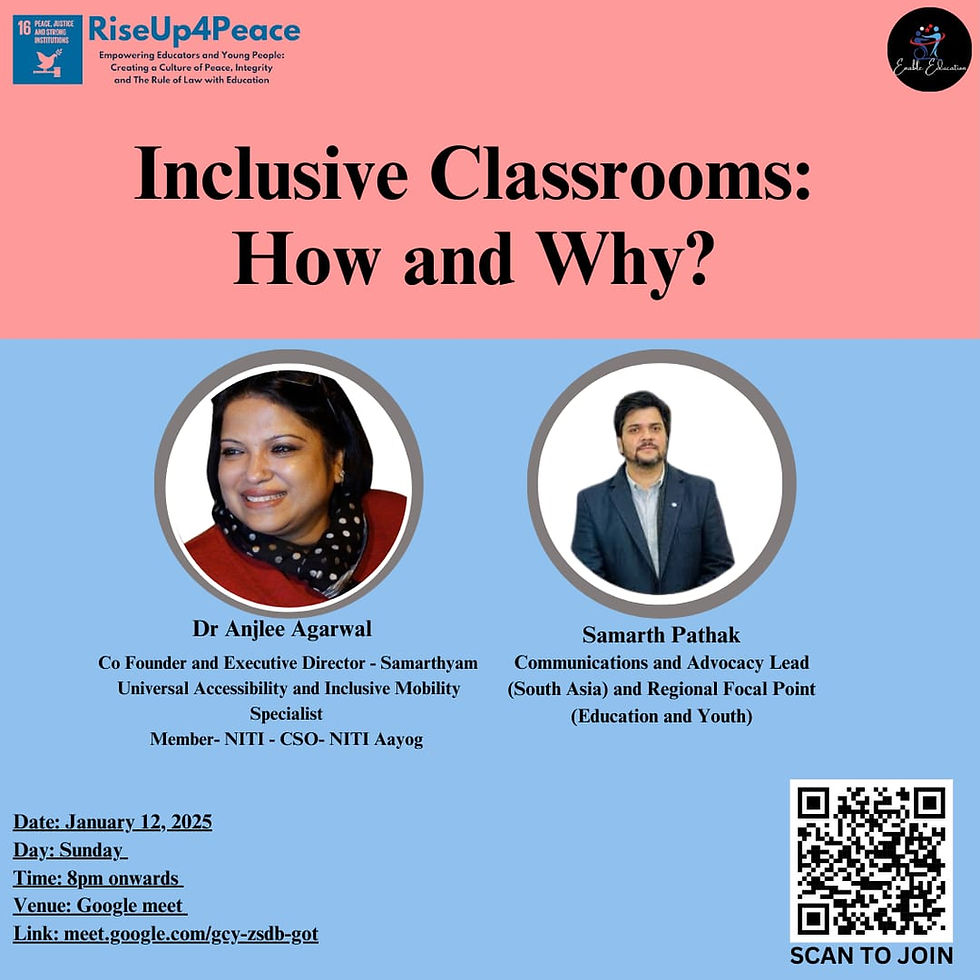Inclusive Classrooms - How & Why?
- Aarushi Gambhir 15
- Dec 6, 2024
- 2 min read
Updated: Jan 15, 2025
Enable Education successfully hosted a virtual event on "Inclusive Classrooms—How & Why?" on 12 January 2025. The event aimed to highlight the importance and practical strategies for creating inclusive classrooms and promoting a culture of inclusion and empathy.

Dr. Anjlee Agarwal, a renowned expert in universal accessibility and inclusive mobility, delivered a thought-provoking presentation. As the Co-founder and Executive Director of Samarthyam, Dr. Agarwal emphasized the importance of sustainable, barrier-free environments and socio-cultural inclusion. Her idea, generated by the 3Ps of life, has become one of the best Universal Design learning programs. "SAMARTHYAM" has turned passion into policy-making and practice, promoting equity, accessibility, and sustainable development goals.
Mr. Samarth Pathak, leading communications, advocacy, and youth initiatives at the UN Office on Drugs and Crime, joined as the Chief Guest, sharing valuable insights on inclusive education.
The discussion highlighted the crucial role of shifting mindsets among children and educators in creating a culture of inclusion. Dr. Agarwal emphasized, "If you don’t include intentionally, you exclude." She also stressed the importance of Universal Design for Learning (UDL) in creating inclusive classrooms. UDL involves designing learning experiences that are accessible and engaging for all students, regardless of their abilities or disabilities. Building on this, our host and founder Ms Aarushi, noted, "UDL is about creating academics for children rather than making children for academics." stressing the importance of tailoring education to fit students rather than forcing students to adapt to rigid systems.
The conversation shifted to Advocacy and collaboration. The speaker emphasized the importance of working alongside the government and engaging in non-confrontational advocacy to ensure lasting change. Building inclusive classrooms, they noted, is not just a policy issue but a collective effort that requires the active participation of educators, parents, and policymakers.
The event also emphasized the need to address attitudinal barriers and recognize every child's unique abilities. Mr. Pathak shared his insights on how inclusive education can help break down stereotypes and promote social inclusion. The importance of sensitization was also highlighted, with Dr. Agarwal emphasizing, "Culture of sensitivity fosters the inclusive environment." Furthermore, the role of advocacy was discussed, with a focus on collaborative, non-confrontational approaches that complement government efforts.
The event concluded on a positive note, with participants engaging in a meaningful discussion and Q&A session. The event reinforced the importance of inclusive education and empowered educators to create more inclusive learning environments.





Comments